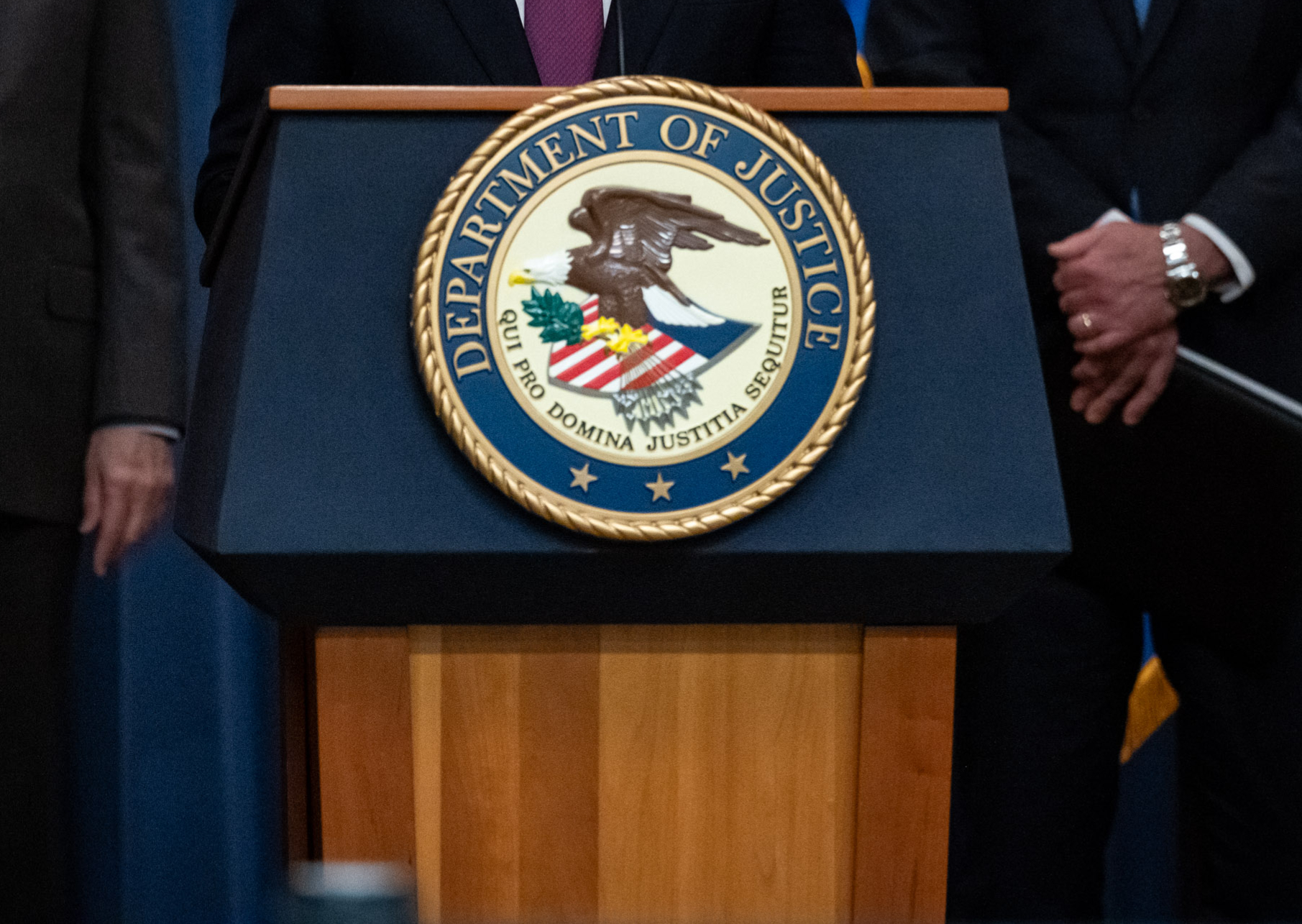Constitution
Enemies of the Administrative State
Profiling an organization dedicated to exposing and opposing the crimes of the American administrative state.

Amid allegations from conservative lawmakers and activists that Washington, D.C.’s most powerful agencies have been weaponized against their critics, one organization has not only played a key role in helping marshal evidence of such malfeasance, but found itself at the center of an emerging government targeting scandal that would seem to only further substantiate the claims of administrative state critics.
That organization is Empower Oversight Whistleblowers & Research. It has represented whistleblowers at the heart of some of the most consequential and contentious congressional investigations in recent years, touching on matters ranging from the impeachment inquiry into President Biden, to alleged FBI inflation of the domestic terror threat.
In a perhaps telling response to these efforts, the nonprofits’ whistleblowing clients have faced not only alleged reprisals from their government employers but also condemnation from Democrats in Congress and skepticism from media outlets that have often uncritically supported whistleblowers.
Recently, evidence has come to light suggesting the Justice Department spied on one of Empower Oversight’s principals while he was serving as a congressional investigator tasked with probing DOJ malfeasance. The man in question, Empower Oversight founder and chairman Jason Foster, is seeking to shed light on this conduct.
Foster launched the watchdog group in July 2021 for the purpose of “helping insiders safely and legally report problems to the proper authorities and … to hold those authorities accountable for fixing them.” Its lawyers help whistleblowers come forward, use the Freedom of Information Act to obtain documents, and when necessary, litigate “so that Americans can confront abuses of authority.”
Foster formed Empower Oversight after accumulating years of experience conducting congressional investigations often built on facilitating protected disclosures from federal employees – including as a top staffer for Senate Judiciary Committee ranking member Charles Grassley, an Iowa Republican.
Foster and another former Grassley staff veteran, Empower Oversight President Tristan Leavitt, helped IRS agent Gary Shapley. He testified, alongside colleague Joseph Ziegler, that the Justice Department thwarted the investigation into the Hunter Biden case and worked to insulate Joe Biden from scrutiny.
Had Shapley not come forward and been shepherded through Congress with Empower Oversight’s assistance, Americans might never have learned of myriad aspects of the Biden family’s foreign dealings and the DOJ’s seeming reluctance to investigate.
Other notable clients aided by Empower Oversight recently include current or former FBI officials Marcus Allen, Steve Friend, and George Hill. These men testified about how the nation’s premier law enforcement agency had engaged in “egregious abuse, misallocation of law-enforcement resources, and misconduct with the leadership ranks,” according to a House Judiciary Committee and Select Subcommittee on the Weaponization of the Federal Government majority report.
Democratic members on the Judiciary Committee issued their own report seemingly aimed at discrediting the FBI whistleblowers in March 2023, including Friend and Hill. Democrats cast these ex-officials as “not, in fact, ‘whistleblowers,’” but rather as disgruntled employees “who put forward a wide range of conspiracy theories” while “not present[ing] actual evidence of any wrongdoing at the Department of Justice or the Federal Bureau of Investigation.”
This adversarial posture was on full display during a May 2023 hearing of the House Judiciary’s Select Subcommittee on the Weaponization of the Federal Government, in which several FBI whistleblowers participated.
Delegate Stacey Plaskett of the Virgin Islands, the ranking subcommittee Democrat, characterized the agents appearing before them, including Allen and Friend, as “a threat to our national security” after word had come down from the FBI just prior to the hearing that the men had had their security clearances stripped. The agents suggest that this move was retaliation for their having come forward.
“[O]ut of malice or ignorance or both,” ranking member Plaskett added, the agents “have put partisan agenda above the oath they swore to serve this country.” The ranking member made these attacks on men with a demonstrated devotion to and records of achievement in defending the United States. Allen, most notably, is a U.S. Marine Corps veteran who served two combat tours in Iraq and was awarded multiple medals for his service.
Minority members had heaped similar scorn on writers Matt Taibbi and Michael Shellenberger. Plaskett smeared the award-winning reporters as “so-called journalists.”
Democrats also tried to demean Jonathan Turley as a defender of polygamists and pedophiles. The normally mild-mannered constitutional law professor confronted the hostile members for their attempts to slime witnesses with whom they disagreed.
But the House Democrats have reserved their greatest vitriol for the “so-called whistleblowers” of the FBI.
Beyond deriding the witnesses and dismissing their testimony, Democrats and media allies have sought to frame them as de facto partisan pawns of House Republicans, in part by dint of their affiliation with conservative-led organizations such as Empower Oversight.
A spokesperson for the watchdog group told me that though it is “disappointing” and “highly hypocritical for those who have vowed in the past to protect whistleblowers,” the skepticism and hostility they have faced is nevertheless “politics as usual in Washington.”
“What makes congressional Democrats’ attacks different is that the mainstream media has trumpeted their partisan narrative while ignoring the facts,” Empower Oversight Senior Communications Advisor Beth Levine said. “If these lawmakers and media outlets were serious, they would engage on the substance of the disclosures and not just attack the messengers (or those providing them with legal aid).”
The instinct of federal bureaucrats to try to silence or undercut whistleblowers did not begin during the Biden administration. Jason Foster’s brush with the Department of Justice began when Donald Trump was president – before he started Empower Oversight – and it happened without his knowledge.
Last October, Foster received a notification that in September 2017, while he was serving as chief investigative counsel to the Chuck Grassley-led Senate Judiciary Committee, the Department of Justice subpoenaed a Google Voice phone number connected to his family’s telephones.
Foster may not have been the only one. Empower Oversight officials believe that other accounts listed in the subpoena are associated with Democratic and Republican attorneys then working on House and Senate staff committees that were scrutinizing the Justice Department.
Kash Patel has publicly indicated that he received a similar notice. A former top staffer for Rep. Devin Nunes, the California Republican who chaired the House Permanent Select Committee on Intelligence, Patel was responsible in large part for drafting the so-called Nunes Memo. Released in February 2018, it detailed deficiencies in the FISA warrant application and renewals used by the Justice Department to snoop on Trump campaign aide Carter Page. The “unacceptable level of errors and omissions” in the applications, as the Justice Department Inspector General would later characterize them, would taint the Trump-Russia collusion investigation from its early days.
Weeks prior to the memo’s release, in a meeting with senior FBI and DOJ officials, Deputy Attorney General Rod Rosenstein reportedly threatened to subpoena the communications of Patel and his colleagues on the House Intelligence Committee in response to their vigorous investigation of the Trump-Russia probe.
Little did Patel know that the Justice Department had already made a practice of issuing subpoenas for such records from congressional staffers.
The request for Foster and his colleagues’ communication records sought not only information about their accounts, but telephone records and text message logs from Dec. 1, 2016, to May 1, 2017. What’s more, the Justice Department would seek, and the courts would grant, five one-year nondisclosure orders prohibiting Google from notifying congressional staff, including Foster, that their records had been sought.
Foster believes that the ostensible basis for the subpoenas may have been the federal investigation, opened in 2017, into the unauthorized disclosure of certain classified information to the media, including the Page FISA warrant, details about which would leak in April of that year.
Interestingly, Foster told RealClearPolitics that he and his colleagues on the Senate Judiciary Committee had reviewed the then-classified FISA application in March 2017, only after the Justice Department had volunteered its existence to them. Foster speculates that “perhaps the career folks thought it would be a persuasive way to convince us there was something real and serious to the Russia collusion claims.”
When, several weeks later, information about the Page FISA warrant emerged publicly, Foster says, “We assumed the leaks came from executive branch or Democrat sources on the Hill – but found it disconcerting that we were shown a classified document we didn’t ask for and then a few weeks later saw info about it leak so quickly – while the FISA coverage was still active, I might add.”
Foster continues, “We certainly understood that would put legislative branch staff in the cone of suspicion for that leak. But lots of others also had access to the information.”
In 2017, the FBI investigated James Wolfe, former security director for the U.S. Senate Select Committee on Intelligence. The following year, the DOJ indicted him on false-statement charges pertaining to the leak investigation. Wolfe would ultimately plead guilty to one count of making a false statement to special agents of the FBI. The false statement, however, concerned whether he had provided unclassified but not publicly available information to reporters, not the leak of the Page FISA warrant.
No such leaker has ever been charged.
Empower Oversight asserted in a FOIA request pertaining to the subpoenas of congressional committee staffers that:
There appears to have been an extensive and far-reaching effort to use grand jury subpoenas and perhaps other means to gather the personal communications records of innocent congressional attorneys and their families with little or no legitimate predicate.
The Justice Department’s Office of Inspector General is currently reviewing the DOJ’s use of subpoenas to target members of Congress and their staffers.
House Judiciary Committee Chairman Jim Jordan recently subpoenaed Attorney General Merrick Garland for documents regarding the targeting of the private communications of legislative branch employees.
In a cover letter, Jordan noted that the executive branch had targeted those “conducting Constitutional oversight of the Department’s investigative actions – actions that were later found to be unlawful.”
For now, Foster chooses his words carefully when asked about the government’s rationale regarding the subpoenas. “We don’t know enough yet to draw conclusions about an ulterior motive beyond legitimately investigating the leak,” he said. “But there has been far too little independent oversight and scrutiny of the process to just presume good faith on the government’s part.”
To get to the bottom of this spying story, Foster recommends that the inspector general and congressional probes should focus on several key questions: Was the government truthful with the court in obtaining the non-disclosure orders? Did it apply the same level of scrutiny to senior executive branch officials with access to the Page FISA application? Did it keep the information it gathered on congressional staff for purposes other than the leak investigation? Finally, were other, more intrusive steps taken to intercept congressional communications than is currently known?
One thing he’s convinced of: If you’re taking flak, chances are you may be getting close to the target. For Empower Oversight, this adage would seem to apply both to its clients and its own principals.
This article was originally published by RealClearPolitics and made available via RealClearWire.
Benjamin Weingarten is Editor at Large at RealClearInvestigations, a Senior Contributor to The Federalist, columnist at Newsweek and The Epoch Times, and a Fellow of the Claremont Institute. He is author of American Ingrate: Ilhan Omar and the Progressive-Islamist Takeover of the Democratic Party (Bombardier, 2020), and a 2019 recipient of TFAS’ Robert Novak Journalism Fellowship, under which he covered the Trump administration’s China policy. Ben has written for The American Mind, City Journal, The New York Post, and numerous other publications. He co-hosts the Edmund Burke Foundation’s “NatCon Squad” podcast. Ben has appeared on “The Rush Limbaugh Show,” “The Ingraham Angle,” and “The Ben Shapiro Show,” among many other programs. He is founder and CEO of ChangeUp Media, a conservative media consulting company. Ben is a 2010 graduate of Columbia University.
-

 Civilization5 days ago
Civilization5 days agoWhy Is Tulsi Gabbard in Georgia? Because Trump Sent Her There
-

 Civilization4 days ago
Civilization4 days agoNot ‘Might Makes Right’ but ‘Might Should Serve Freedom’
-

 Guest Columns5 days ago
Guest Columns5 days agoModeration Is the Most Disruptive Movement in American Politics
-

 Civilization3 days ago
Civilization3 days agoThree Radical Ideas to Reform the Scientific Enterprise
-

 Guest Columns3 days ago
Guest Columns3 days agoCan AI Write a Better Protest Song Than Bruce Springsteen?
-

 Executive3 days ago
Executive3 days agoWaste of the Day: L.A. Funds Activists, Then Group Sues
-

 Education4 days ago
Education4 days agoWaste of the Day: Universities Pile Up Billions in Research Overhead Costs
-

 Civilization2 days ago
Civilization2 days agoMeta’s Nuclear Bet Is an Endorsement of Trump’s Energy Vision












